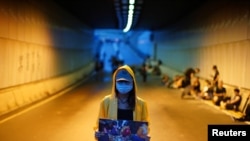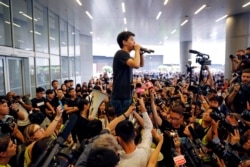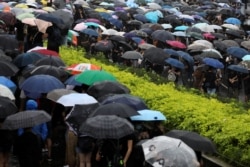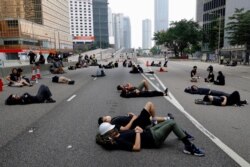The U.S. voiced new support Monday for Hong Kong democracy activists, saying they were demonstrating for basic rights.
State Department spokesman Morgan Ortagus said the hundreds of thousands of street protesters calling for withdrawal of a proposal to extradite criminal suspects to China for trial and the resignation of the city's pro-Beijing leader Carrie Lam were engaged in peaceful protests for "things which are enshrined into basic law."
She said the demonstrators were marching "for the rights of freedom of speech, for freedom of assembly. ... And so of course, as we observe these, we continue to call on the Hong Kong government to address the concerns of their public."
Hong Kong democracy activist Joshua Wong joined the throngs of protesters calling for Lam's resignation after he was released from prison Monday.
"Carrie Lam must step down," Wong told reporters. Wong was one of the leaders of the 2014 Umbrella Movement and had spent two months in prison on charges related to those protests.
He predicted that if Lam remains in office, more and more people will "join our fight until the day we get back our basic human rights and freedom."
Authorities reopened roads Monday near government headquarters after nearly two million protesters clad in black marched Sunday against the controversial bill that would allow for extradition to China. Mostly young protesters blocked a street near the city's waterfront, as they stood outside Lam's office.
Sunday's protest brought major swathes of Hong Kong's shopping and government districts to a standstill. The demonstrations came the day after the bill was suspended by Lam, but the protesters say they will continue until the bill is permanently revoked.
Meanwhile, U.S. Secretary of State Mike Pompeo says President Donald Trump plans to discuss the Hong Kong issue with his Chinese counterpart, Xi Jinping, at the upcoming G-20 summit in Japan.
'Evil law'
Protester Steven Chow said he did not attend previous protests, but was drawn to the latest demonstration because of the way other protesters had been treated earlier in the week.
Last week, riot police used tear gas, pepper spray and rubber bullets on primarily youthful protesters who had surrounded the legislature and were attempting to occupy major roads in a similar manner to the 2014 Umbrella Movement democracy protesters.
"We just want to express our view that the Hong Kong government did not do [things] correctly," Chow said. "The people in Hong Kong ... just expressed their view peacefully and they cannot treat the students and the Hong Kong people that way."
Sunday, leader Lam made a rare apology to the public for the "great contradictions and disputes in the community" caused by the extradition bill.
While the bill would allow for Hong Kong to extradite to a number of jurisdictions on a case-by-case basis where it does not have a long-term agreement, the prospect of extradition to China in particular has alarmed a wide cross-section of Hong Kong society.
Many protesters and pro-democracy legislators call it an "evil bill" or "evil law" which they see as an infringement on Hong Kong's autonomy, which was promised to the former British colony until 2047.
Growing mistrust
In 2003, a similar action by the government to suspend an unpopular bill ended protests but mistrust in Lam's government appeared to run deep in protesters Sunday.
"We can see from previous issues that Carrie Lam also used this [delay] tactic on different issues. The government will still try to have the bill at a certain moment but not now," said protester Angel Woo.
Woo said she also felt growing mistrust in Hong Kong police, who used "unacceptable" violence to clear protest sites.
Protester Michael Chen echoed her views and said he felt that Lam's government had not listened to public discontent about the bill.
"We feel that the government is not listening to the people and they try to push through the bill without enough consultation, so we are trying to do the right thing," he said.
He thought the bill had been canceled due to external forces impacting Beijing, which said it fully backed Lam's decision on Saturday after a reported meeting between Lam and top officials in Shenzhen, according to Hong Kong media.
"There is lots of pressure to the Chinese government for two reasons: one is the trade war with the United States and the second one is because the Taiwanese presidential campaign is coming up soon. They are afraid Hong Kong's political situation will encourage the anti-Chinese government president."
Hong Kong, a former British colony, was granted special autonomy for 50 years after it returned to Chinese sovereignty in 1997. But many in Hong Kong are concerned China is slowly encroaching on those rights and tightening its grip on the territory.
The so-called Umbrella Movement protests were launched in 2014 to demand the direct election of the city's top leader after China reneged on promises of universal suffrage by 2017. The protests ended without winning any concessions from the Hong Kong government.







